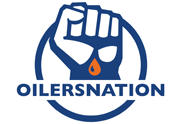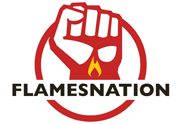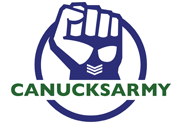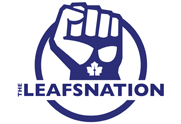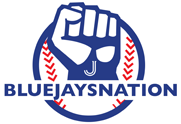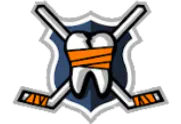What Price Glory?
Hockey is the sport where the very toughest guys go to play. Every player
on a hockey team takes his fair share of hits and checks. Every hockey player
will play through pain and injury at some point in his career. A special few
are chosen to protect and defend their teammates in the curiously violent way
that hockey accepts and even encourages. The team "enforcers" will
go out on the ice on any given night and drop sticks, gloves and helmets to
settle a score with fisticuffs. The enforcers are the very men who are known
and often revered for doling out physical punishment and retribution on a game-to-game
basis. These guys are a specific breed of hockey player, and they usually work
through an unspoken, but very clear system of "honor" that defines
their fighting. For a few of them, this system of honor is being rocked to
its core by this August’s "Hockey Gladiators" Tournament.
For the good or ill of hockey, for two days in August some of the NHL’s and
various minor pro-leagues’ most physical players will take to the ice at the
Target Center in Minneapolis to go toe to toe in series of gameless hockey
brawls. In a major and controversial twist, things turn from a game without
a fight to a fight without a game. The combatants will have an opportunity
to square off with each other in full hockey gear, except for gloves and helmets.
Fight judges will determine the winner/survivor, who will walk away with $100,000.
Every hockey game costs a player. It costs in physical energy, costs in emotional
and spiritual energy, costs in physical wear and tear. Like the opera soprano
who thinks she has only a finite number of high "C"’s before she
runs out of them, a hockey player’s body can only sustain a certain amount
of repetitive movement and punishment before it starts to break down. Why would
any man want to hasten his physical degradation by getting himself involved
in a fight during a game? Why would any man risk physical punishment and perhaps
a career-ending injury to participate in an event that really has very little
to do with actual hockey?
Lee Jacobson, an imposing 6’4", and 230 lbs., asked himself that same
question last season. Jacobson postponed a very promising career as a CHL fighting
defenseman by taking all of last season off. He felt the time had come to reevaluate
the toll that his body was taking. Jacobson began 2002 as one of the CHL’s
most enthusiastic fighters. He seemed to relish his on-ice scraps and post-game
notoriety. He could often be seen in the penalty box with a broad, beaming
smile, blowing kisses to his opponent. But by the end of 2003, Jacobson found
himself hobbling around in a shoulder sling, with a piece of plastic shoved
in his nostrils to hold his oft-broken nose in place. He’s back in professional
hockey now, training daily, including some boxing. But he has re-thought much
of what he feels fighting in hockey is about.
"It’s when the fights don’t mean anything that can take a toll on you.
Sticking up for your buddy, or bringing it to a guy who’s mouthed off at you
is one thing. But fighting to simply please the crowd, night in and night out,
can lead to a physical and mental meltdown. I’ll never back down from a fight,
but a fight has to have a purpose, a reason."
So, does the Hockey Gladiators event have a reason for being? Jacobson paused
and took a good long breath before responding with some hard words. "For
what? If you’re a player on your last legs, if this is all that you have, and
you’re looking to go out on that one last burst of glory, then you’ll have
a good bar story to tell when you’re 45. But Hockey Gladiators debunks the
game of hockey. Why take the game out of it? Why don’t they just hold it out
on a parking lot somewhere? Hockey is a sport terribly concerned about violence
right now. It takes purposeless fighting to a new level."
Despite those thoughts – Jacobson still plans on catching the fights in Minneapolis.
Most all of us will rise from our seats and cheer when a fight breaks out
during a hockey game. It can be a rousing, exciting event, it can sometimes
alter the outcome of a game, and it usually always charges up the atmosphere
at a rink several notches. Many of us will guffaw and catcall as we watch our
perceived team enemy spit his teeth out onto the ice after a neat rounder from
our guy’s flying fist. But often the violence on the ice can become a mere
cartoon to those of us who aren’t feeling the pain. It’s easy to give little
thought to the suffering that carries beyond the evening’s "scrap".
Well, when you know a hockey enforcer, and he’s sitting next to you, and his
hand is wrapped because he snapped a tendon in his hand on some guy’s face,
and both his eyes are blackened from having the aforementioned guy giving him
a rhinoplasty in return, the reality of what a hockey fight really is comes
home hard. At least if you have a compassionate bone in your body, it does.
Jeff Scharf, a rugged veteran of the OHL, ECHL and CHL can get a little irritated
by the public’s concentration on hockey’s more pugilistic aspects. The centerman
would rather the focus remain on the actual game.
"At home, (in Sudbury, Ontario) our junior team can go a whole season
without a fight, and nobody complains. Nobody demands a fight. If a fight breaks
out in a good, solid game, and it’s the result of high emotion, high energy,
then, I’m not against it. Hell, I’ve DONE it, but people here in the States
seem to really feel that fights are a necessary part of the game. It seems
to be what they come out to the game for. Fighting for fighting’s sake. Hockey
doesn’t need that. No one needs that."
Scharf knows what he’s talking about. Scharf’s own physical toughness aside,
his brother-in-law is former NHL fighter Troy Crowder, Wayne Gretzky’s personal
enforcer for two seasons during 1994 through 1996 with the Los Angeles Kings.
Scharf and Crowder have had opportunities to discuss the mixed feelings both
of them have about the place fighting has in hockey.
At the other end of the spectrum, there are more than a few players who contemplate
the Hockey Gladiators tournament with some amusement.
"Well, you’ve got to take it with a grain of salt," says CHL toughman
Steve Reid. "Accept it for what it is. This isn’t like an extreme fighting
event, where guys are there to truly beat the living hell out of each other,
until one drops with his life-blood draining from him. From what I understand,
it’s just like a hockey fight would be in a game. When the guy goes down, the
fight’s over."
Steve Reid probably would have been a terrific candidate for Hockey Gladiators.
Broad and solid, he’s a fearless fighter, but he knows that he must pace himself
to keep his career thriving. "I’m puzzled why the NHL guys are involved
with this. I guess they’re not playing anymore, and have nothing to lose. For
them, it can’t be an issue of the money, like it would be for the minor-pro
players. It must be for kicks, for the chance to add to the legend. For a guy
in the minors, who does his shopping at Wal-Mart, well, the money is going
to be a big factor. That, and the fact that the NHL and AHL will be watching,
even if they don’t approve. It’s going to earn these guys some attention."
Scott English happened to have more PIM’s (with 324) in 2003-04 than any other
CHL defenseman. At 22, English is "smallish" by enforcer standards,
standing 6 feet, and weighing 195 lbs., but he’s ferocious in his tenacity.
He has an ability to take a large amount of punishment and stay in the game.
But he’d be less than enthusiastic about participating in Hockey Gladiators.
The risk simply isn’t worth the benefit to him. "Are you kidding? I’d
be killed!" he says, laughing. "There are a lot of really impressive
fighters involved with it. And there’s no way I’d do it. I don’t have the experience
yet to go up against some of the guys who are fighting. I’m going to watch
it with my buddies, though."
The onus for the success or failure of Hockey Gladiators will rest primarily
on the shoulders of its paying audience. How the event is perceived and received
by the public (a large group of whom seem to be not only hockey watching fans
but hockey players as well) could perhaps determine how hockey is regarded
by the more casual hockey watcher. Is it going involve a keen and educated
appreciation of fighting skill and physical prowess, or will it be merely a
baboonish display of testosterone gone wild? And, are the younger, less-experienced
guys being offered up for sacrifice on the altar of the big-time "goons" for
the pleasure of the paying public?
Steve Reid has a philosophical take on the matchup between the older, legendary
ice warriors and the less-storied, less-tested fighters in the group. "You
know, in a fight, all it takes is that one lucky punch."
For more on Hockey Gladiators, check out www.hockeygladiators.com.


